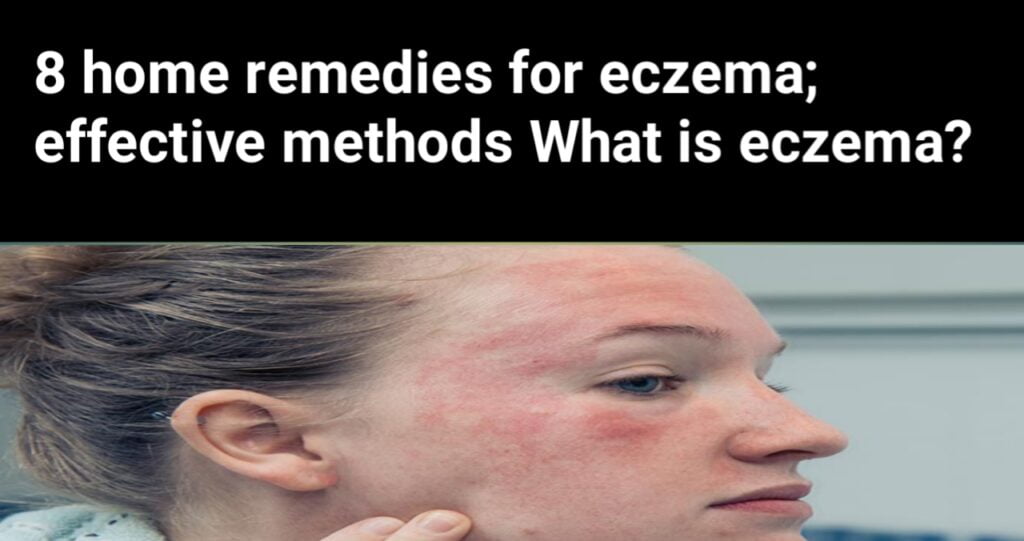
8 home remedies for eczema; Simple and effective methods that work wonders
What is eczema?
Eczema is a common skin disease that occurs when the skin’s protective barrier is weaker than it should be. Without a strong barrier, moisture can more easily escape from the skin and allow bacteria and viruses to enter. This can lead to dry, red, itchy patches, especially on the face, hands, feet, insides, and behind the knees.
The causes of eczema are not fully understood, but it is thought that people with eczema have an overactive immune system that causes their skin to become inflamed, irritated, and itchy.
এক পলকে
8 practical and useful home remedies for eczema
- Gentle body wash
Rule number 1 of home remedies for eczema is to use the right cleanser. A gentle, soap-free cleanser is less likely to strip your skin of its protective barrier and cause dryness. If it is free of color and fragrance, it is much better. - Using a suitable moisturizer for eczema
Regular hydration with an ointment or moisturizer will both reduce dryness itself, which can lead to itching, and act as a barrier to avoid potential irritants. Go for a thick moisturizer and again, avoid anything with dyes or fragrances. Repeat this as often as necessary. Moisturizers are generally considered a very important home remedy for eczema. - Reduce your body temperature
A hot shower or bath may seem soothing, but for eczema, it usually makes things worse. Too hot water can irritate your skin, so try to wash your skin with cool water. - Do not scratch your body
Scratching makes dry, irritated skin worse. To avoid having to scratch yourself, try an over-the-counter (OTC) anti-itch spray. You don’t need to apply the sprays on your skin. Because rubbing the skin may irritate the itch.
Wear a pair of cotton gloves at night so you don’t accidentally scratch yourself while you snooze.
- Wear comfortable cotton clothes
Heat and sweat are serious triggers for itching, so try to regulate your body temperature. Wear loose, breathable clothing when the weather is hot or humid. - Take an oatmeal bath
Colloidal oatmeal contains natural emollients that soothe red, inflamed skin and reduce uncomfortable irritations. Grind the semolina into powder and pour it into the tub and bathe in it. Sleep in the tub for 15 to 20 minutes and then rinse and use a moisturizer. - Use apple cider vinegar
Research on the use of apple cider vinegar for eczema is very limited; But some experts say that adding 2 cups of apple cider vinegar to a tub of lukewarm water can help ease your discomfort and is a home remedy for eczema. - Use a fumigator
Dry indoor air can further dry the skin, especially in winter. But a humidifier can add moisture to the air and help you feel more comfortable.
Eczema home treatment
What is the best cream to treat eczema?
In general, there are many creams for this purpose. However, strong moisturizers can be very helpful. In severe cases, the eczema doctor may prescribe corticosteroid cream.
What fruits are good for treating eczema?
In general, eczema is caused by dryness. Therefore, the use of moist fruits like cucumber and potato on eczema can be useful and can be considered a home remedy for eczema.
Is it possible to treat eczema with honey?
Yes. Honey is considered a home remedy for eczema. You can put it on the affected area and cover it with a light bandage for a few hours. For more information ,
How I naturally cured my eczema?
It’s important to note that I am not a medical professional, and individual responses to treatments can vary. If you have successfully managed your eczema, it’s great that you found a solution that works for you. However, what works for one person may not work for another, and it’s essential to consult with a healthcare professional for personalized advice.
1.That being said, some people find relief from eczema symptoms through various natural remedies and lifestyle changes. Here are some general suggestions that individuals have reported finding helpful:
2.Identifying Triggers: Pay attention to potential triggers for your eczema flare-ups, such as certain foods, stress, or environmental factors. Avoiding or managing these triggers can be beneficial.
3.Maintaining Moisture: Keeping your skin well-moisturized is crucial for eczema management. Use fragrance-free, hypoallergenic moisturizers regularly, especially after bathing.
4.Choosing Gentle Skincare Products: Opt for mild, fragrance-free soaps and detergents to avoid irritating your skin. Harsh chemicals can exacerbate eczema symptoms.
5.Dietary Changes: Some people report improvements in their eczema symptoms by making changes to their diet. Common dietary changes include avoiding certain allergens, processed foods, and increasing intake of foods rich in omega-3 fatty acids.
6.Stress Management: Stress can contribute to eczema flare-ups. Practices like meditation, yoga, or deep breathing exercises may help manage stress levels and improve skin conditions.
7.Wet Wrap Therapy: This involves applying a damp layer of clothing or bandages over moisturized skin. Consult with a healthcare professional before attempting this method.
8.Natural Oils: Some individuals find relief from eczema symptoms by applying natural oils such as coconut oil, olive oil, or jojoba oil to the affected areas.
Remember that what works for one person may not work for another, and it’s crucial to consult with a healthcare professional for advice tailored to your specific situation. They can provide guidance based on your medical history, the severity of your condition, and other individual factors.
What clears eczema up fast?
Clearing up eczema quickly can vary from person to person, and there is no one-size-fits-all solution. However, here are some general tips that some individuals find helpful in managing and reducing eczema symptoms quickly:
Hydration: Keep your skin well-hydrated by applying a hypoallergenic and fragrance-free moisturizer. Moisturizing helps to create a barrier that prevents water loss from the skin and can soothe dryness and itching.
1.Topical Steroids: In some cases, doctors may prescribe topical steroids to quickly reduce inflammation and itching. It’s crucial to use them as directed by your healthcare provider and to avoid long-term or excessive use, as they can have side effects.
2.Avoiding Triggers: Identify and avoid triggers that may worsen your eczema symptoms. This could include certain foods, allergens, or environmental factors.
3.Short, Lukewarm Baths: Take short, lukewarm baths and avoid hot water, as hot water can strip the skin of natural oils, leading to dryness. Add oatmeal or colloidal oatmeal to your bath, which may help soothe the skin.
4.Prescription Medications: In some cases, doctors may prescribe medications such as antihistamines or immunosuppressants to manage severe eczema symptoms.
5.Wet Wrap Therapy: Wet wrap therapy involves applying a damp layer over moisturized skin and covering it with a dry layer. This can help lock in moisture and soothe the skin. Consult with a healthcare professional before trying this method.
6.Over-the-Counter (OTC) Moisturizers: Some people find relief from eczema symptoms using over-the-counter moisturizers that contain ingredients like ceramides or hyaluronic acid. These ingredients help restore the skin’s natural barrier.
7.Cool Compresses: Applying cool compresses to the affected areas can help alleviate itching and inflammation.
It’s important to note that while these suggestions may provide relief for some, eczema is a complex condition, and individual responses to treatments can vary. If your symptoms persist or worsen, it’s crucial to consult with a healthcare professional for a proper diagnosis and personalized treatment plan. They can help determine the underlying causes of your eczema and recommend appropriate interventions.
What is the overnight remedy for eczema?
While there’s no one-size-fits-all overnight remedy for eczema, some people find relief by following specific strategies before bedtime. Here are some suggestions that may help soothe eczema symptoms overnight:
1.Moisturize Before Bed: Apply a thick layer of a hypoallergenic and fragrance-free moisturizer before bedtime. This helps to lock in moisture and prevents the skin from drying out overnight.
2.Occlusive Dressing: Consider using occlusive dressings, such as wet wraps or a layer of a natural oil (like coconut oil) followed by a damp bandage. Consult with a healthcare professional before attempting this method, as it may not be suitable for everyone.
3.Cool Compress: Apply a cool compress to the affected areas before bed to reduce inflammation and itching. Make sure the compress is not too cold to avoid irritation.
4.Cotton Sleepwear: Wear loose-fitting, breathable cotton clothing to bed. Avoid synthetic fabrics or tight clothing, as these may further irritate the skin.
5.Humidifier: Use a humidifier in your bedroom to maintain adequate humidity levels. Dry air can contribute to skin dryness and exacerbate eczema symptoms.
6.Avoiding Irritants: Ensure your bedding is clean, and consider using hypoallergenic bedding materials. Avoid harsh detergents, fabric softeners, and perfumed products that may irritate the skin.
7.Antihistamines: If itching is a significant issue, consult with a healthcare professional about taking an over-the-counter antihistamine before bedtime. This can help reduce itching and improve sleep quality.
8.Prescription Medications: If your eczema is severe, your healthcare provider may prescribe topical steroids, immunosuppressants, or other medications. Follow your healthcare professional’s instructions for using these medications.
It’s crucial to note that what works for one person may not work for another, and the effectiveness of these remedies can vary. Additionally, it’s essential to consult with a healthcare professional for personalized advice based on your specific condition and medical history. If your eczema persists or worsens, seek professional medical guidance for an accurate diagnosis and appropriate treatment.
What can I drink to help eczema?
While there is no specific drink that can cure eczema, staying hydrated and incorporating certain beverages into your diet may help support overall skin health. Here are some drinks that might be beneficial:
1.Water: Staying well-hydrated is crucial for overall skin health. Water helps to keep your skin hydrated and may contribute to a healthier complexion.
2.Herbal Teas: Some herbal teas are known for their anti-inflammatory and antioxidant properties, which may be beneficial for eczema. Examples include chamomile tea, calendula tea, and rooibos tea. These teas are caffeine-free and may help soothe irritated skin.
3.Green Tea: Green tea contains antioxidants called polyphenols that may have anti-inflammatory effects. Drinking green tea in moderation could be a part of a skin-friendly diet.
4.Coconut Water: Coconut water is hydrating and contains electrolytes, which may be beneficial for overall skin health. However, moderation is key as coconut water also contains natural sugars.
5.Aloe Vera Juice: Aloe vera is known for its soothing properties and may help with skin inflammation. Drinking aloe vera juice (make sure it’s suitable for internal use) in moderation might be worth considering, but consult with a healthcare professional before adding it to your routine.
6.Bone Broth: Rich in collagen and amino acids, bone broth may support skin health. Collagen is essential for maintaining the structure of the skin. Make sure to choose low-sodium options.
7.Fruit and Vegetable Juices: Freshly squeezed juices from fruits and vegetables, especially those rich in vitamins A, C, and E, may contribute to skin health. Carrot, celery, cucumber, and watermelon are examples of hydrating options.
While these drinks may offer potential benefits, it’s important to note that individual responses vary, and there is no one-size-fits-all solution for eczema. Additionally, it’s crucial to maintain a well-balanced and nutritious diet, as overall health can influence skin conditions. Consult with a healthcare professional or a registered dietitian for personalized advice tailored to your specific needs and condition. They can provide guidance on dietary changes that may complement your overall eczema management plan.



